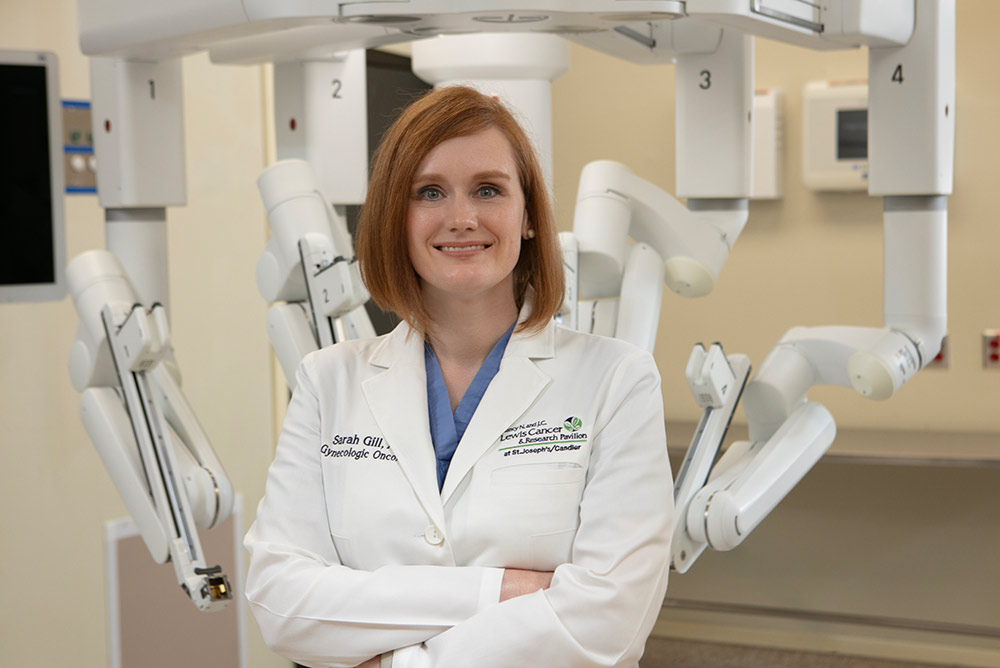Advanced surgical and other diagnostic cancer services at the LCRP
With advanced technology, expert oncology surgeons and specialists and a coordinated approach, the Nancy N. and J.C. Lewis Cancer & Research Pavilion (LCRP) at St. Joseph's/Candler offers the latest treatment options tailored to each patient's unique needs.
Groundbreaking surgical solutions for cancer care
Our dedication to excellence is demonstrated through the advanced surgical procedures offered through our program.
With highly trained surgeons on staff experienced in complex cancer surgery, our surgical teams join forces with medical oncologists, radiologists and other specialists to ensure a detailed and cutting-edge approach to cancer care. We are able to provide options that lead to fewer complications and a renewed sense of hope for our patients.

Robotic surgical techniques for cancer surgery precision
The da Vinci Surgical System represents the pinnacle of precision in cancer surgery. This robotic system enables minimally invasive procedures with its high-performance 3D HD vision system. Through this advanced approach, patients benefit from reduced recovery times and less discomfort as their body heals.
Robotic-assisted surgery allows surgeons to operate with enhanced control, reducing risks during complex procedures. It is especially beneficial for patients requiring difficult operations, as it provides unparalleled accuracy, even in hard-to-reach areas.
Benefits of minimally-invasive surgery
Our cancer specialists are highly skilled in noninvasive surgical techniques, providing patients with more seamless treatment experience. These procedures offer several advantages:
- Faster return to daily activities
- Reduced blood loss and need for transfusions
- Shorter hospital stays and quicker recovery
- Minimized pain
This approach improves physical recovery and helps patients regain emotional strength by reducing the overall impact of surgery on their lives. With smaller incisions and faster healing, patients can focus on their path to wellness more quickly.
Expert team with a multidisciplinary approach
The LCRP cancer care team employs a multidisciplinary approach to treatment, ensuring that every patient receives the expertise of an entire team of professionals. Our oncology surgeons meet to discuss individualized cases, crafting personalized treatment plans based on national guidelines. This collaborative process ensures that each patient receives the most effective care possible.
The team includes board-certified oncology surgeons, specialized radiologists, pathologists and resolute oncology nurses. By pooling their expertise, the team can anticipate challenges and adapt to each patient’s needs. This coordinated approach ensures every treatment plan reflects the latest advancements in cancer care that we offer.
Patients can also benefit from access to clinical trials and groundbreaking therapies that are not widely available outside major metropolitan cities. These opportunities demonstrate our commitment to staying at the forefront of cancer treatment innovations, right here in our community.
Advanced diagnostic techniques for precision treatment
Accurate diagnosis is crucial for determining the best course of treatment. Our advanced diagnostic services provide reliable tissue samples and reduce patient discomfort and the time needed to begin treatment. This ensures a seamless experience for patients as they move from diagnosis to therapy/treatment. At LCRP, we offer state-of-the-art diagnostic options, including:
- Fine needle aspiration
- Core needle biopsy
- Excisional tissue biopsy
- Advanced techniques like ultrasound-guided or stereotactic breast biopsies
By leveraging the most advanced imaging technology, our specialists can pinpoint the location and extent of cancer, creating highly accurate treatment plans. Early and precise diagnosis is one of the most significant factors in successful cancer care, and we prioritize leveraging the best resources to make sure we offer this to all our patients.
Radiofrequency ablation: Targeted cancer treatment
Radiofrequency ablation (RFA) offers a low-impact, highly effective treatment option for certain cancers. This procedure uses electronic frequencies to destroy cancerous cells without harming surrounding organs. It is particularly beneficial for patients with lung, kidney, or liver cancers. RFA offers hope to patients who may not be candidates for traditional surgery due to health concerns or the location of their tumor. The procedure's less intrusive nature ensures less disruption to surrounding healthy tissue, making it an ideal option for specific cases.
In addition to cancer treatment, RFA is used to address cardiac arrhythmias and gynecologic conditions like endometriosis and uterine fibroids. For women seeking alternatives to hysterectomy, RFA provides faster recovery and less pain. The procedure is quick and avoids the need for general anesthesia. Patients can typically resume normal activities within days, making it a convenient option for those with busy lives.

